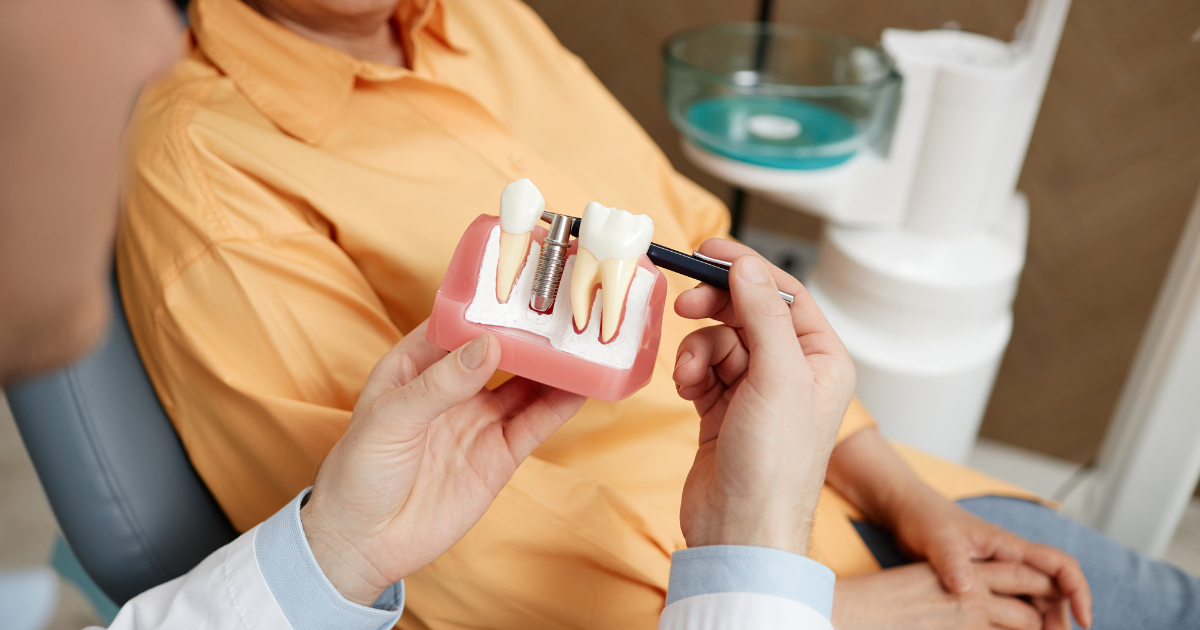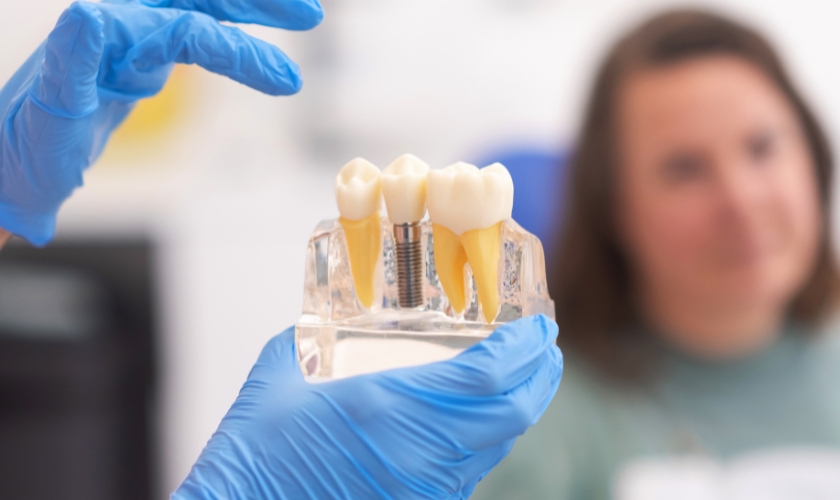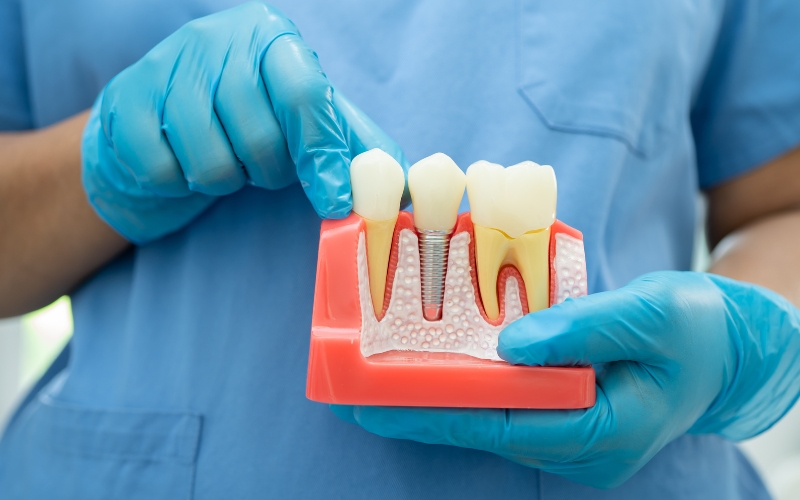We are Not A MassHealth Provider
Complications After Dental Implants: How to Deal with Them

Dental implants offer a fantastic solution for those looking to restore their smiles and regain functionality. However, like any medical procedure, dental implants come with potential complications. Being informed about these issues and knowing how to handle them can make a significant difference in your recovery process.
Common Dental Implant Complications
Dental implant complications are rare but can occur. Understanding these potential issues is crucial for managing them effectively.
Infection at the Implant Site
One of the most common complications is infection. Bacteria can invade the implant site, causing redness, swelling, and pain. If left untreated, this can lead to severe problems, including bone loss.
Preventive Measures and Solutions:
- Maintain Oral Hygiene: Brush and floss regularly, especially around the implant area. Use an antibacterial mouthwash to reduce bacteria.
- Monitor Symptoms: If you notice persistent swelling, pain, or unusual discharge, consult your dentist immediately. Early detection is critical to preventing severe infections.
- Antibiotics: If you have an infection, your dentist may prescribe antibiotics. Complete the entire course as directed to ensure the disease is entirely eradicated.
Peri-Implantitis
Peri-implantitis is when the tissue around the implant becomes inflamed, leading to bone loss. It is akin to periodontitis but affects the implant area.
Preventive Measures and Solutions:
- Regular Check-Ups: Schedule regular visits to your dentist for professional cleanings and check-ups. Early detection can prevent peri-implantitis from progressing.
- Avoid Smoking: Smoking can exacerbate peri-implantitis. If you smoke, consider quitting to improve your oral health.
- Professional Cleaning: If peri-implantitis develops, professional deep cleaning around the implant may be necessary. Surgery might sometimes be required to remove infected tissue and restore the bone.
Implant Failure
Though rare, implant failure can occur. This usually happens due to improper integration with the jawbone, excessive stress on the implant, or poor bone quality.
Preventive Measures and Solutions:
- Bone Grafting: If your jawbone is too thin or soft, a bone graft can provide a sturdy foundation for the implant.
- Follow Post-Op Instructions: Adhering to your dentist’s aftercare instructions can significantly reduce the risk of implant failure. Avoid putting excessive pressure on the implant site during the healing period.
- Healthy Lifestyle: Maintain a healthy diet and lifestyle to support your overall health and the healing process.
Nerve Damage
Nerve damage is a rare complication that can result in numbness, tingling, or pain in the surrounding tissues if the implant is placed too close to a nerve.
Preventive Measures and Solutions:
- Pre-Surgical Planning: Detailed imaging and planning before the surgery can help avoid nerve damage. Make sure your dentist uses advanced imaging techniques to map the implant placement accurately.
- Immediate Attention: If you experience persistent numbness or pain, seek immediate attention from your dentist. Early intervention can prevent long-term damage.
Sinus Problems
Implants in the upper jaw are at risk of penetrating the sinus cavity, which can lead to sinus infections or discomfort.
Preventive Measures and Solutions:
- Sinus Lift Surgery: A sinus lift procedure can create more bone height to support the implant and avoid sinus complications before placing implants in the upper jaw.
- Monitor Symptoms: Post-surgery, monitor for symptoms like sinus infections and report them to your dentist promptly.
Effective Aftercare for Dental Implants
Proper aftercare is vital to prevent complications and ensure the success of your dental implants.
Immediate Post-Surgery Care
Right after your surgery, follow these steps to support healing:
- Rest: Take it easy for the first 24-48 hours. Avoid strenuous activities that could increase blood flow and swelling in the implant area.
- Cold Compresses: Apply ice packs to reduce swelling and discomfort. Do this for 15 minutes at a time, with breaks in between.
- Soft Diet: Stick to soft foods and avoid chewing on the implant site. Gradually reintroduce more complex foods as you heal.
Long-Term Care
Maintaining your dental implants requires ongoing care:
- Oral Hygiene: Brush and floss daily, particularly concerning the implant area. Use a soft-bristled toothbrush and non-abrasive toothpaste to avoid damaging the implant.
- Regular Dental Visits: See your dentist regularly for professional cleanings and check-ups. This helps catch potential issues early and keeps your implants in good condition.
- Healthy Habits: Avoid habits that could damage your implants, such as chewing on complex objects or using your teeth as tools.
Dietary Considerations
Your diet plays a crucial role in the health of your dental implants:
- Nutrient-rich foods: Eat foods rich in vitamins and minerals, especially calcium and vitamin D, to support bone health.
- Hydration: Drink plenty of water to keep your mouth hydrated and help with the healing process.
When to Contact Your Dentist
Knowing when to reach out to your dentist can prevent minor issues from becoming major problems:
Signs of Infection
Persistent pain, swelling, or discharge from the implant site should prompt an immediate call to your dentist. Early intervention can prevent the infection from spreading and causing more severe complications.
Unusual Sensations
Contact your local dentist if you experience numbness, tingling, or a loose feeling in the implant. These symptoms could indicate nerve damage or implant failure.
Regular Check-Ups
Even if everything seems fine, maintain regular dental check-ups. These visits allow your dentist to monitor the health of your implants and address any issues promptly.
The Role of Your Dentist
Your dentist plays a crucial role in the success of your dental implants. Their expertise ensures you get the best possible outcome from the initial consultation to post-surgery care.
Initial Consultation
During the initial consultation, your dentist will assess your oral health and determine if you’re a good candidate for dental implants. They will discuss the procedure, potential risks, and aftercare requirements.
Surgical Expertise
Choosing a dedicated and efficient dentist for your implant surgery is essential. Their expertise can minimize the risk of complications and ensure the implant is placed correctly.
Post-Surgery Support
Your dentist will provide detailed aftercare instructions and be available to address any concerns or complications. Regular follow-up appointments will help monitor your progress and catch any issues early.
Building a Partnership with Your Dentist
A strong partnership with your dentist is vital to the long-term success of your dental implants. Open communication and trust ensure you receive the best care and support.
Ask Questions
Don’t hesitate to ask your dentist any questions you have about the procedure, aftercare, or potential complications. Understanding every aspect of your treatment can alleviate anxiety and help you feel more confident.
Follow Advice
Adhering to your dentist’s advice and instructions is crucial for a successful outcome. Their recommendations are based on extensive knowledge and experience.
Stay Informed and Enhance Your Smiles Seamlessly with Dental Implants
Stay informed about the latest advancements in dental technology and dental implant aftercare. This knowledge can help you make informed decisions and maintain the health of your implants.
Dental implants can transform your smile and improve your quality of life. By understanding potential complications and taking proactive steps to prevent and manage them, you can enjoy the full benefits of your dental implants. Remember to maintain a strong relationship with your trusted local dentist in Holden for ongoing support and care. Your dental implants can provide a lasting, beautiful smile with the right approach.




